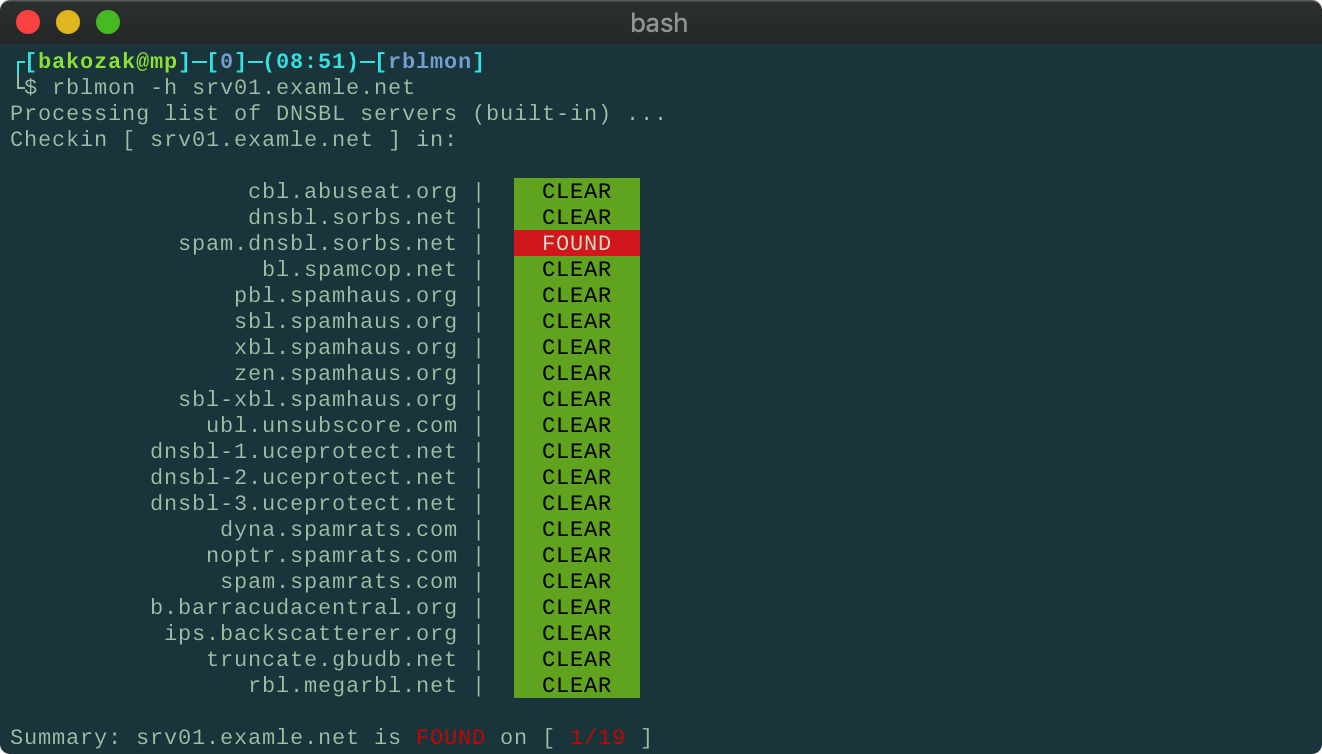Rblmon monitors your IP address or list of IP addresses on specific DNS Blacklist server or list of servers. It allows you to specify your own list of IP and DNSBL servers. By default, it prints all result in a more user-friendly way, but for further processing, you can use a 'quit' option.
To get the latest version just clone it from Github. Copy it to your globally accessible paths and make executable.
git clone https://github.com/bkzk/rblmon.git
cd rblmon
install -m0755 rblmon /usr/local/bin
It requires a DNS tool called 'dig' which can be found in a most modern Linux distribution.
#debian/ubuntu
apt-get install dnsutils
#centos/red-hat
yum install bind-utils
Besides that you should install two extra perl modules, they are not mandatory but it’s better to have them.
Data::Validate::IPData::Validate::Domain
These modules should be found with your distro repositories, if not you can try to install them using a cpan command.
#debian/ubuntu
apt-get install libdata-validate-ip-perl libdata-validate-domain-perl
#centos/redhat
yum -y install perl-Data-Validate-IP perl-Data-Validate-Domain
#cpan - compile
cpan -i Data::Validate::IP Data::Validate::Domain
rblmon -h [ip|hostname|file] [-d hostname|file] [-r ip|hostname] [-q]
[-log|-logall] [-l filename] [-ld dirname] [-man|-help]
Use -help or -man argument to get more information. You probably need to install a perl-doc package to be able to read perl manual.
If there is no DNSBL server specified at the command line, a default built-in list of popular DNSBL servers is used.
$ rblmon -h srv01.example.net
Processing list of DNSBL servers (built-in) ...
Checkin [ srv01.example.net ] in:
cbl.abuseat.org | CLEAR
dnsbl.sorbs.net | CLEAR
spam.dnsbl.sorbs.net | CLEAR
bl.spamcop.net | CLEAR
pbl.spamhaus.org | CLEAR
sbl.spamhaus.org | CLEAR
xbl.spamhaus.org | CLEAR
zen.spamhaus.org | CLEAR
sbl-xbl.spamhaus.org | CLEAR
ubl.unsubscore.com | CLEAR
dnsbl-1.uceprotect.net | CLEAR
dnsbl-2.uceprotect.net | CLEAR
dnsbl-3.uceprotect.net | CLEAR
dyna.spamrats.com | FOUND
noptr.spamrats.com | CLEAR
spam.spamrats.com | CLEAR
b.barracudacentral.org | CLEAR
ips.backscatterer.org | FOUND
truncate.gbudb.net | CLEAR
bl.spamcannibal.org | CLEAR
rbl.megarbl.net | CLEAR
Summary: srv01.example.net is FOUND on [ 2/20 ]
To verify single host status on specific DNSBL server.
$ rblmon -h 192.0.2.2 -d dnsbl.sorbs.net
To verify single host status on your own list of DNSBL servers.
$ rblmon -h srv01.example.net -d dnsblserver.txt -r 8.8.8.8
When you have a pool of IP addresses or you need to verify multiple hosts you can use a file with the list of IP’s o hostnames (one per line) eg. myservers.txt. You can verify this list against specific DNSBL server or list of DNSBL servers store in file eg. dnsblserver.txt .
$ rblmon -h myservers.txt -d dnsblserver.txt -r 8.8.8.8
Resolver: @8.8.8.8
Processing list of DNSBL servers (myservers.txt) ...
Processing list of hosts (dnsblserver.txt) ...
Checkin [ srv01.example.net ] 47/47 | CLEAR
Checkin [ srv02.example.net ] 47/47 | FOUND [2]
Checkin [ srv03.example.net ] 47/47 | CLEAR
Checkin [ srv04.example.net ] 47/47 | FOUND [2]
Checkin [ srv05.example.net ] 47/47 | FOUND [1]
Checkin [ srv06.example.net ] 47/47 | FOUND [3]
Checkin [ srv07.example.net ] 47/47 | CLEAR
Checkin [ srv08.example.net ] 47/47 | CLEAR
Checkin [ srv09.example.net ] 47/47 | CLEAR
Checkin [ srv10.example.net ] 47/47 | FOUND [1]
Checkin [ srv11.example.net ] 47/47 | CLEAR
Checkin [ srv12.example.net ] 47/47 | CLEAR
Checkin [ srv13.example.net ] 47/47 | CLEAR
Checkin [ srv14.example.net ] 47/47 | CLEAR
Checkin [ srv15.example.net ] 47/47 | CLEAR
Checkin [ srv16.example.net ] 47/47 | FOUND [1]
Checkin [ srv17.example.net ] 47/47 | FOUND [1]
Summary: FOUND 7 of 17 hosts on DNSBL
Setting resolver from the command line allows you to use a different DNS server than defined by your system (eg. /etc/resolv.conf).
If there is a need for further processing, use a --quiet parameter to only retrieve the status.
$ rblmon -h srv01.example.net -d dnsblserver.txt -r 8.8.8.8 -q
srv01.example.net: 0
srv02.example.net: 2
srv03.example.net: 0
srv04.example.net: 2
srv05.example.net: 1
srv06.example.net: 3
srv07.example.net: 0
srv08.example.net: 0
srv09.example.net: 0
srv10.example.net: 1
srv11.example.net: 0
srv12.example.net: 0
srv13.example.net: 0
srv14.example.net: 0
srv15.example.net: 0
srv16.example.net: 1
srv17.example.net: 1
To log some information use -log or -log-all . The difference between this two is that the first of these contains only hosts present on at least one blacklist and the other contains all the hosts and their statuses.
#-log
srv02.example.net: sbl.spamhaus.org, zen.spamhaus.org
srv04.example.net: cbl.abuseat.org, ips.backscatterer.org
srv05.example.net: ips.backscatterer.org
srv06.example.net: xbl.spamhaus.org, zen.spamhaus.org, sbl-xbl.spamhaus.org
srv10.example.net: b.barracudacentral.org
srv16.example.net: b.barracudacentral.org
srv17.example.net: dnsbl-1.uceprotect.net
#-log-all
srv01.example.net: CLEAR
srv02.example.net: sbl.spamhaus.org, zen.spamhaus.org
srv03.example.net: CLEAR
srv04.example.net: cbl.abuseat.org, ips.backscatterer.org
srv05.example.net: ips.backscatterer.org
srv06.example.net: xbl.spamhaus.org, zen.spamhaus.org, sbl-xbl.spamhaus.org
srv07.example.net: CLEAR
srv08.example.net: CLEAR
srv09.example.net: CLEAR
srv10.example.net: b.barracudacentral.org
srv11.example.net: CLEAR
srv12.example.net: CLEAR
srv13.example.net: CLEAR
srv14.example.net: CLEAR
srv15.example.net: CLEAR
srv16.example.net: b.barracudacentral.org
srv17.example.net: dnsbl-1.uceprotect.net
The default name of the log file is dnsbl-YYYY-MM-DD.log and is stored in the current working directory. You can change the name of the file using -l switch and/or log directory with -ld switch.
In case you want to keep some logs, you can create a simple cron job to do this for you. In the example below all logs will be stored in /var/log/rbl/, so make sure this directory exists and that the user running the cron has write permissions. Set a proper path to your server and to DNSBL list (one ip or hostname per line).
crontab -e
30 0 * * * rblmon -h /path/to/server.list -d /path/to/dnsbl.list -q -log-all -ld /var/log/rbl/ &>/dev/null
